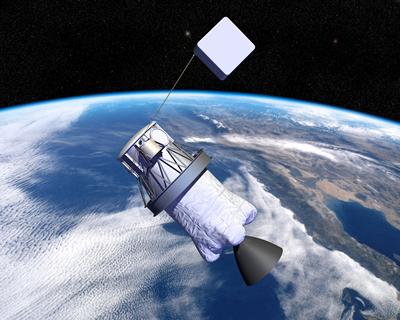Testing space technology skills by building a working satellite

Engineering students from the University of Southampton are embarking on an exciting project to build a satellite to investigate how items fall to Earth from low orbits. It will be launched from the International Space Station (ISS) in 2017/18 and should take up to 18 months to descend and eventually burn up in the planet’s atmosphere.
The challenging fourth year 'Small Satellite' group project is the culmination of studies for 15 final year undergraduates, ten from Engineering and five from Electronics and Computer Science at the University. Senior Lecturer Dr Adrian Tatnall is the group’s supervisor.
Masters of Engineering (MEng) Aeronautics and Astronautics student Mark Coulter explains: “We can already model decaying orbits at high altitudes but not well at lower levels. This project will help scientists understand more about how what happens as items enter the atmosphere less than 400 km above the Earth. Knowing more about decaying objects at low altitudes will contribute to the University's leading research in space debris modelling.”
The 10cm CubeSat will be equipped with solar power, a camera and communications systems, stability controls and a global positioning system (GPS) so scientists on the ground can keep track of its progress.
To put the distances into perspective, airliners fly around 11 km above the Earth, ‘space’ begins at 100km and the ISS orbits at 400km. While some commercial satellites can be found at 1,000km, key weather and telecommunications satellites are located in geostationary orbits around 36,000km above the planet.
“Members of the team started work on their various parts of the project in early October and we should have a model to test by February,” says Mark. “I’ve been interested in space technology for many years and am thrilled to take part in this assignment as I want to work in the industry after graduation. My work on the CubeSat will be a great addition to my CV.”
All MEng students take part in a group project in their final year. Not only a test of their engineering knowledge and abilities, it helps them develop essential skills such as team working, project management, communications and presentations which will be valuable in during their careers.
Engineering students:
Georgina Coles
Joe Mann
Joel Galley
Jonny Coates
Kav Ratwatte
Luke Taylor
Mark Coulter
Perry Fung
Raluca Cojocariu
Stuart Reid
Electronics and Computer Science students:
Ben Andrews
Lewis Cooper
James Bantock
John Blackwood
William Hector
Engineering PhD Students:
Alek Lidtke
Clemens Rumpf